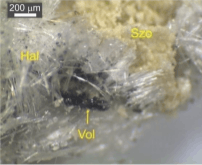Szomolnokite
Szomolnokite (Fe2+SO4·H2O) is a monoclinic iron sulfate mineral forming a complete solid solution with magnesium end-member kieserite (MgSO4·H2O).[1] In 1877 szomolnokite’s name was derived by Joseph Krenner from its type locality of oxidized sulfide ore containing iron in Szomolnok, Slovakia (Hungary at the time).[1][2][3]
| Szomolnokite | |
|---|---|
 Halotrichite (Hal); szomolnokite (Szo) and voltaite (Vol) | |
| General | |
| Category | Sulfate mineral |
| Formula (repeating unit) | Fe2+SO4 · H2O |
| Strunz classification | 7.CB.05 |
| Dana classification | 29.6.2.2 |
| Crystal system | Monoclinic |
| Crystal class | Prismatic (2/m) |
| Identification | |
| Color | Sulfur-yellow, yellow-brown, red-brown, blue, colorless |
| Crystal habit | Bipyramidal, distorted, tabular, parallel growths, globular, stalactites |
| Fracture | Conchoidal to sub-conchoidal, uneven |
| Tenacity | Brittle |
| Mohs scale hardness | 2.5 |
| Luster | Vitreous |
| Diaphaneity | Translucent |
| Specific gravity | 3.03–3.07 (measured), 3.10 (calculated) |
| Optical properties | Biaxial (+), colorless (transmitted light) |
| 2V angle | 80° (measured), 86° (calculated) |
| References | [1][2][3] |
As of mid-January 2020 the only continent on which szomolnokite has not been found and reported is Antarctica.[1]
References
Bibliography
- Palache, P.; Berman H.; Frondel, C. (1960). "Dana's System of Mineralogy, Volume II: Halides, Nitrates, Borates, Carbonates, Sulfates, Phosphates, Arsenates, Tungstates, Molybdates, Etc. (Seventh Edition)" John Wiley and Sons, Inc., New York, pp. 479-480.
This article is issued from Wikipedia. The text is licensed under Creative Commons - Attribution - Sharealike. Additional terms may apply for the media files.